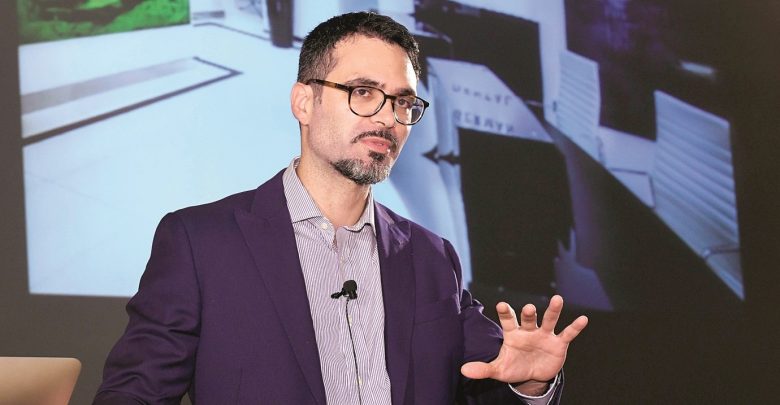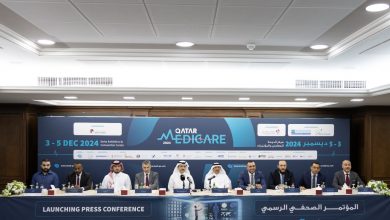
Experts speak about cardiovascular disease, oral cancer at WCM-Q event
«وايل كورنيل» تناقش أسباب سرطان الفم وأمراض القلب والأوعية الدموية
Doha: Two leading experts in their respective fields of medicine spoke at Weill Cornell Medicine-Qatar’s (WCM-Q) Grand Rounds to discuss oral cancer and the impact of lifestyle on cardiovascular disease risk.
Visiting expert Dr. Sanjiv Kaul of the Knight Cardiovascular Institute at the Oregon Health & Science University in Portland gave a presentation titled ‘Lifestyle and Cardiovascular Risk’. Dr. Kaul, who also holds the title of Professor of Medicine and Radiology, explained how both dietary and non-dietary changes to lifestyle habits can improve cardiovascular outcomes, as well as discussing the impact of judicious use of cooking oils on cardiovascular health.
Dr. Kaul said: “Coronary artery disease (CAD) is the number one killer of people in the world today. Our risk of CAD is determined in part by factors beyond our control, such as family history, gender and age. But many, many other factors that determine CAD risk are within our control, such as developing diabetes through poor lifestyle choices, sedentary lifestyle, smoking, cholesterol, obesity, stress and hypertension. In fact, 85 percent of CAD is preventable and can be treated if detected early. “So, lifestyle plays a very, very important role in coronary artery disease.”
Dr. Kaul then explained the impact on CAD risk of various factors, including physical activity, body weight, diet, caffeine consumption, smoking, sleep and stress.
Dr. Dominique Laatz, Oral Surgeon at the German Dental Center in Doha, gave a presentation titled ‘Oral Cancer: Basic Facts and Early Detection’, in which he outlined the demographic patterns of oral cancer incidence, discussed the methodology of cancer screening, and explained the risk factors that make oral cancer more likely, such as tobacco use, alcohol consumption, human papilloma virus (HPV), and chewing betel quids or areca nuts. Dr. Laatz also discussed the advantages of the enhanced recovery after surgery (ERAS) protocol.
Dr. Laatz said: “Over 85 percent of all oral cancer cases are associated with tobacco consumption – that is clearly a very significant number. Furthermore, consuming alcohol plus tobacco is a very bad idea because it the effect is ‘super-multiplicative’ – that means you get a much, much higher risk if you do them both, it does not just double.”
Both lectures were accredited locally by the Qatar Council for Healthcare Practitioners-Accreditation Department (QCHP-AD) and internationally by the Accreditation Council for Continuing Medical Education (ACCME).
نظّم قسم التعليم الطبي المستمر في «وايل كورنيل للطب- قطر» محاضرتين: الأولى حول نمط الحياة وأثره في زيادة مخاطر الإصابة بأمراض القلب والأوعية الدموية، والثانية حول سرطان الفم.
وتحدّث في الأولى الدكتور سانجيف كاول من معهد نايت للقلب والأوعية الدموية في جامعة أوريجون للعلوم الصحية والعلوم في بورتلاند، فيما قدّم الثانية الدكتور دومينك لاتز طبيب جراحة الأسنان في المركز الألماني لطب الأسنان في الدوحة.
وناقش الدكتور كاول كيف يمكن لتغيير أنماط الحياة المحافظة على صحة القلب والأوعية الدموية، سواء كانت هذه الأنماط مرتبطة بالعادات الغذائية أو بغيرها، بما فيها استخدام الزيوت في الطهي.
وقال: «يُعدّ مرض الشريان التاجي السبب الأول للوفيات في العالم، حيث تعتمد الإصابة به على مجموعة من عوامل الخطورة الخارجة عن سيطرتنا مثل التاريخ العائلي والجنس والعمر، وعلى عوامل خطورة أخرى يمكننا السيطرة عليها والتحكم فيها، مثل: الإصابة بمرض السكري الناتج عن الخيارات الخاطئة المرتبطة بأنماط الحياة، وقلة الحركة، والتدخين، وارتفاع نسبة الكوليسترول في الجسم، والسمنة، والتوتر، وارتفاع ضغط الدم، وتناول كميات كبيرة من الكافيين، وعدم الحصول على ساعات كافية من النوم. وفي حقيقة الأمر، فإنه يمكن معالجة حوالي 85 % من حالات مرض الشريان التاجي والوقاية منها إذا شُخّصت في مراحل مبكرة».
وتحدّث الدكتور لاتز في المحاضرة الثانية عن السمات الديموغرافية لحالات الإصابة بسرطان الفم والمنهجيات المتبعة للكشف عنه وعوامل الخطر التي تزيد احتمال الإصابة به، مثل: التدخين، واستهلاك الكحول، والإصابة بفيروس الورم الحليمي البشري، ومضغ التنبول أو بندق الأريكا في بعض البلدان. كما ناقش فوائد بروتوكول التعافي المعزّز للمرضى بعد خضوعهم للعمليات الجراحية.
وقال الدكتور لاتز: «أكثر من 85 % من حالات سرطان الفم مرتبطة باستهلاك التبغ، وهي نسبة كبيرة كما نلاحظ، كما أن استهلاك التبغ والكحول معاً يُعدّ من أخطر الممارسات الخاطئة؛ لما لها من عواقب وخيمة؛ إذ إن خطر الإصابة بسرطان الفم يكون أكبر».;



